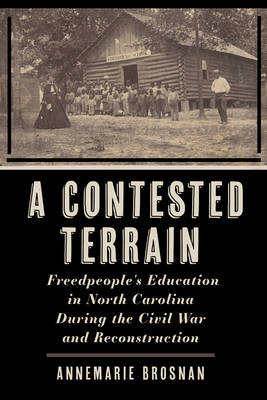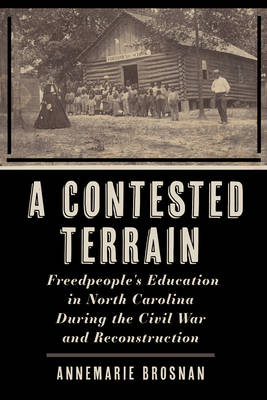
- Afhalen na 1 uur in een winkel met voorraad
- Gratis thuislevering in België vanaf € 30
- Ruim aanbod met 7 miljoen producten
- Afhalen na 1 uur in een winkel met voorraad
- Gratis thuislevering in België vanaf € 30
- Ruim aanbod met 7 miljoen producten
Zoeken
A Contested Terrain
Freedpeople's Education in North Carolina During the Civil War and Reconstruction
Annemarie Brosnan
€ 48,45
+ 96 punten
Uitvoering
Omschrijving
A testament to the resilience and determination of Black North Carolinians to achieve educational equality
This book examines the educational experiences of Black North Carolinians during the American Civil War and Reconstruction period, 1861-1877. By highlighting the collaborative efforts that led to the growing network of schools for the formerly enslaved people, it argues that schooling the Freedpeople was a contested terrain, fraught with conflicting visions of Black freedom and the role education should play. Although Black men and women emerged as the driving force behind the educational endeavors of this period, their work was facilitated by Northern aid and mission-ary societies, the federally-mandated Freedmen's Bureau, and over 1,400 teachers from various regional and racial backgrounds. Yet the educational landscape was far from uniform, and the individuals and organizations involved had their distinct visions regarding the nature and purpose of Freedpeople's education. Through the use of qualitative and quantitative research methods, this book offers new insights into the reasons why Black and white Northerners and Southerners elected to become teachers. By examining their diverse motivations and experiences, it argues that attitudes toward Freedpeople's education were complex and fluid, defying neat characterization. Despite mounting obstacles and opposition to their work, Black North Carolinians' unrelenting quest for education ultimately gave rise to free public schooling for both races, the professionaliza-tion of Black teachers, and an extensive network of Historically Black Colleges and Universities.Specificaties
Betrokkenen
- Auteur(s):
- Uitgeverij:
Inhoud
- Aantal bladzijden:
- 224
- Taal:
- Engels
- Reeks:
Eigenschappen
- Productcode (EAN):
- 9781531509293
- Verschijningsdatum:
- 4/03/2025
- Uitvoering:
- Paperback
- Formaat:
- Trade paperback (VS)
- Afmetingen:
- 152 mm x 229 mm
- Gewicht:
- 303 g

Alleen bij Standaard Boekhandel
+ 96 punten op je klantenkaart van Standaard Boekhandel
Beoordelingen
We publiceren alleen reviews die voldoen aan de voorwaarden voor reviews. Bekijk onze voorwaarden voor reviews.











